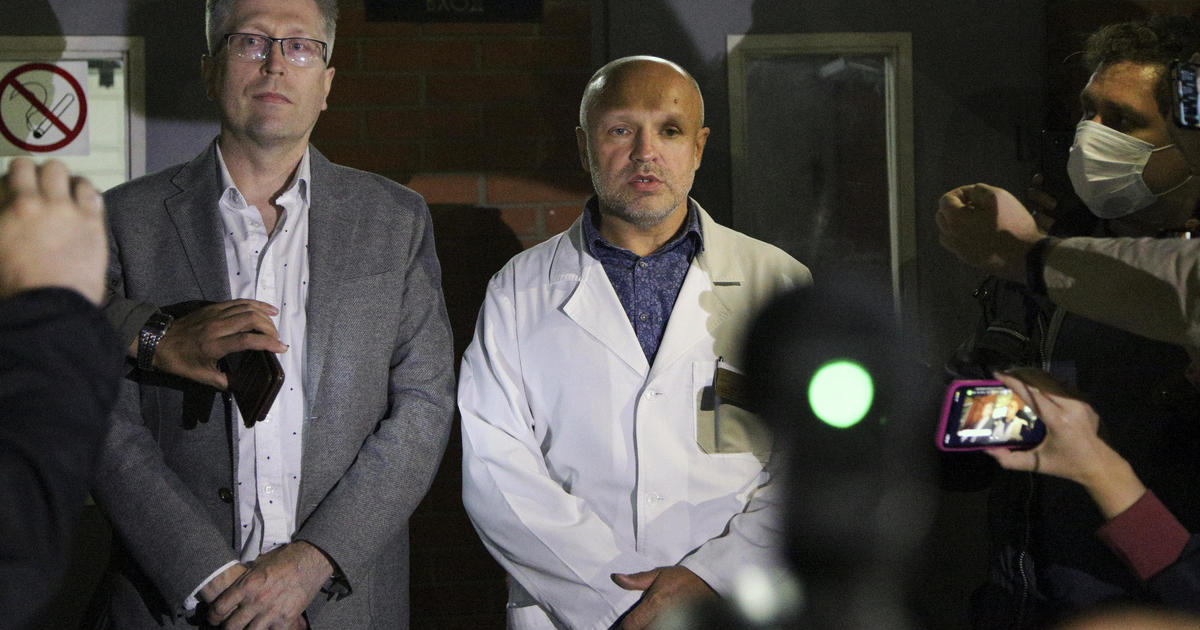Russian doctors gave opposition leader Alexei Navalny permission to be transferred abroad for medical treatment, a senior physician said Friday. The reversal came after more than 24 hours of wrangling over Alexei Navalny’s condition and treatment.
The 44-year-old politician and corruption investigator who is one of President Vladimir Putin’s fiercest critics is in a coma after a suspected poisoning. He was admitted to an intensive care unit in the Siberian city of Omsk on Thursday after he lost consciousness on a plane, which made an emergency landing.
His supporters believe he was poisoned and that the Kremlin is behind it.
Russian opposition leader Alexei Navalny, center, and Kira Yarmysh, foreground left, pose for a selfie inside a bus on their way to an aircraft at an airport outside Tomsk, a city in Siberia, Russia on August 20, 2020.
gluchinskiy/AP
A senior doctor at the facility claimed, however, that no poison was found in Navalny’s body, and their preliminary diagnosis was that he suffered from a sudden drop in blood sugar.
Omsk news outlet NGS55 published a video statement of the hospital’s chief doctor, Alexander Murakhovsky, saying a metabolic disorder was the most likely diagnosis and that a drop in blood sugar may have caused Navalny to lose consciousness.
Western toxicology experts expressed doubts that a poisoning could have been ruled out so quickly.
“It takes a while to rule things out. And particularly if something is highly toxic – it will be there in very low concentrations, and many screening tests would just not pick that substance up,” said Alastair Hay, an emeritus professor and toxicology expert from the school of medicine at the University of Leeds.
Navalny’s family and supporters wanted him brought to a top German medical clinic, but his physicians in Omsk had said he was too unstable to move, even after a plane with German specialists and advanced equipment arrived on Friday. Navalny’s supporters denounced that as a ploy by authorities to stall until any poison would no longer be traceable in his system.
German doctors examined Navalny on Friday and said he was fit to be transported, according to a representative of the charity that has organized the plane to bring him to Berlin.
“I understand he’s still unconscious, but they’re used to such special assignments and they say very clearly he can fly and they want to fly him,” film producer Jaka Bizilj, of Cinema For Peace, told The Associated Press after being in contact with the German doctors.
Deputy chief doctor of the Omsk hospital Anatoly Kalinichenko then told reporters on Friday that he would be allowed to leave. The flight was scheduled for Saturday morning, Russia’s RIA Novosti news agency reported, citing airport officials.
Anatoly Kalinichenko, deputy chief doctor of the Omsk Ambulance Hospital No. 1, right, and Boris Teplykh, head of the department of anesthesiology and resuscitation of the Pirogov’s medical center, speak to the media at the intensive care unit where Alexei Navalny was hospitalized, in Omsk, Russia August 21, 2020.
Evgeniy Sofiychuk/AP
Earlier, a Kremlin spokesman Dmitry Peskov denied that prior resistance to the transfer was political. He said he wasn’t aware of any instructions to stop the transfer and that it was purely a medical decision.
“It may pose a threat to his health,” Peskov said.
Navalny fell ill on a flight back to Moscow from Siberia on Thursday and was taken to the hospital after the plane made an emergency landing. His team made arrangements to transfer him to Charité, a clinic in Berlin that has a history of treating famous foreign leaders and dissidents and insisted that the transfer is paramount to saving the politician’s life.
Navalny’s spokesperson, Kira Yarmysh, had said the “the ban on transferring Navalny is needed to stall and wait until the poison in his body can no longer be traced. Yet every hour of stalling creates a threat to his life.”
Dr. Yaroslav Ashikhmin, Navalny’s physician in Moscow, earlier dismissed the idea that it would be dangerous to move the patient. He told The Associated Press that being on a plane with specialized equipment, including a ventilator and a machine that can do the work of the heart and lungs, “can be even safer than staying in a hospital in Omsk.”
Yarmysh posted pictures of what she said was a bathroom inside the hospital that showed squalid conditions, including walls with paint peeling off, rusting pipes, and a dirty floor and walls.
Врачи омской больницы заявляют, что нет никакой необходимости лечить Алексея в клинике Шарите в Берлине, потому что условия здесь ничуть не хуже, чем там. Вот так выглядит туалет в приемном отделении омской больницы: pic.twitter.com/C6vkVmBT6A
— Кира Ярмыш (@Kira_Yarmysh) August 21, 2020
Navalny’s wife told reporters that hospital staff and men she suspected were law enforcement agents didn’t let her speak to the German specialists, who she said were brought into the facility in secrecy, through a back door.
“I was forcibly kicked out in a rude manner,” Yulia Navalnaya said, her voice shaking. “This is an appalling situation. They are not letting us take Alexei. We believe that clearly something is being hidden from us.”
President Trump said Thursday the U.S. government was still looking into the reports on Navalny, and that he expected Secretary of State Mike Pompeo to report to him on it soon.
“He’s a very courageous man. He is a very courageous politician to have stood up to Putin inside Russia, and our thoughts and our prayers are with him and his family,” Mr. Trump’s national security adviser Robert O’Brien told Fox News on Thursday. “It’s extraordinarily concerning and if the Russians were behind this … it’s something that we’re going to factor into how we deal with the Russians going forward.”
